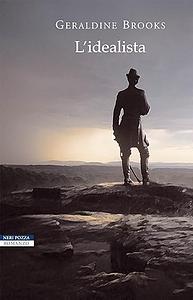Take a photo of a barcode or cover
I had a strong negative reaction to this book through the first 2/3rds. It only started to turn a bit when the Marmee section began and Brooks started to deconstruct some of the assumptions Mr. March made about the world and specifically about the women he loved in the world. I liked a lot of that last section except that it still contributed to a big sin of this book, which is being fanfiction that makes me like characters and moments from the original canon less, at least when viewed through the lens of this author's perspective. I don't think it ruined the original or anything like that but I don't think it added to my appreciation of Little Women. I also didn't enjoy it as a Civil War book. My feelings during the first parts were mostly that it was a book that used Black suffering as a way to develop the emotional arcs of white characters, which sucks, and even though this got shifted a little when Grace got the opportunity to call Mr. March out a bit, I still think that it's a book that's primarily concerned with how he feels about the world and honestly I'm just not that interested in how this version of Mr. March feels about the world.
Side-note: There's this bit about how Marmee was Mrs. March's childhood nickname and that's why even Mr. March calls her that in his POV but I think Marmee is just how the girls said Mommy in their little New England accents. I could be wrong but if not, I found it pretty distracting. You're a grown man, Mr. March, stop calling your wife Mommy.
Side-note: There's this bit about how Marmee was Mrs. March's childhood nickname and that's why even Mr. March calls her that in his POV but I think Marmee is just how the girls said Mommy in their little New England accents. I could be wrong but if not, I found it pretty distracting. You're a grown man, Mr. March, stop calling your wife Mommy.
I'm torn about this book. I think that Brooks is a very good writer with a wonderful talent for prose. Year of Wonders (also by Brooks) is one of my favorite books. I found myself wishing that I could like Mr. March more. He didn't seem like a real person to me, but a platform from which to preach at the reader. Mr. March wants to be a martyr. I'm not sure how much of this is very convincing writing on the part of Brooks, and how much of it is using literature to push a social agenda. In all fairness, Little Women is guilty of the same thing, so perhaps Brooks did this on purpose. My favorite parts of the book were the parts from Mrs. March's perspective. She seemed like a real person to me, whereas Mr. March seemed like an caricature.
Being a huge fan of novels that take place during the US civil war and the novel Little Women I could not wait to dive into this one and I was not disappointed! March is a is really well-written and researched work of fiction based on real life people/events. I am always intrigued when an author takes a well know novel or character and builds a whole new story around them. The *only* thing I found off putting was how Marmee was portrayed, I found her rather unlikable and she came across as a spoiled brat 95% of the time. A thumb up for this one!!
dark
emotional
hopeful
informative
sad
This was a very popular book club selection. We had a fabulous discussion over it and the implications for our days. Highly recommend.
(This is a fill-in review. I'm going back and reviewing books from my notes written at the time I read the book before blogging and Goodreads participation. Written 7/27/21)
(This is a fill-in review. I'm going back and reviewing books from my notes written at the time I read the book before blogging and Goodreads participation. Written 7/27/21)
How did this trashy fan fiction win the Pulitzer Prize?
Did the Pulitzer board read a different book than I did?
Can I trust the Pulitzer Prize ever again after reading this garbage?
Why did Australian born Geraldine Brooks feel the need to ride the coat tails of Louisa Alcott in order to tell a lame story about the United States Civil War?
Why does “progressive” Mr. March treat animals better than women? Why did Brooks think Mr. March having a romantic relationship with a slave and cheating on his wife was a good idea? Is Brooks trying to butcher a character that is not even hers?
How am I supposed to read with a straight face that “poverty requires aptitude” and “we lived without ostentation” on the same exact page as we learn that they had a “housekeeper…chef…valet…and…nursery maid.” Does Mr. March know what poverty is?
Does Brooks understand how patronizing it is when she writes, “I don’t believe I have ever been so tired as I was those evenings, not even in the aftermath of battle. Teaching the Negroes required a vast expenditure of physical energy, as I found that if I did not talk with a high degree of animation and an almost theatrical amount of expression, I could not hold their attention”? Is she aware of how racist this sounds? And is she seriously claiming that teaching these students was harder than a civil war battle? Has any combat veteran of any war ever claimed this?
Did anyone else want to chuck the book across the room when Grace said, “He loves, perhaps, an idea of me: Africa, liberated”?
Did anyone laugh out loud when they read, “According to this, your husband’s bowels have moved eighteen times in the last thirty hours. This is incompatible with any hope for recovery”? Is this real science, Brooks? If not (it’s not), did you consider other ways of just saying “he’s dying”? Is this really necessary?
Was anything in this book really necessary?
1 star.
Did the Pulitzer board read a different book than I did?
Can I trust the Pulitzer Prize ever again after reading this garbage?
Why did Australian born Geraldine Brooks feel the need to ride the coat tails of Louisa Alcott in order to tell a lame story about the United States Civil War?
Why does “progressive” Mr. March treat animals better than women? Why did Brooks think Mr. March having a romantic relationship with a slave and cheating on his wife was a good idea? Is Brooks trying to butcher a character that is not even hers?
How am I supposed to read with a straight face that “poverty requires aptitude” and “we lived without ostentation” on the same exact page as we learn that they had a “housekeeper…chef…valet…and…nursery maid.” Does Mr. March know what poverty is?
Does Brooks understand how patronizing it is when she writes, “I don’t believe I have ever been so tired as I was those evenings, not even in the aftermath of battle. Teaching the Negroes required a vast expenditure of physical energy, as I found that if I did not talk with a high degree of animation and an almost theatrical amount of expression, I could not hold their attention”? Is she aware of how racist this sounds? And is she seriously claiming that teaching these students was harder than a civil war battle? Has any combat veteran of any war ever claimed this?
Did anyone else want to chuck the book across the room when Grace said, “He loves, perhaps, an idea of me: Africa, liberated”?
Did anyone laugh out loud when they read, “According to this, your husband’s bowels have moved eighteen times in the last thirty hours. This is incompatible with any hope for recovery”? Is this real science, Brooks? If not (it’s not), did you consider other ways of just saying “he’s dying”? Is this really necessary?
Was anything in this book really necessary?
1 star.
challenging
dark
emotional
hopeful
informative
inspiring
sad
tense
medium-paced
challenging
reflective
sad
medium-paced



